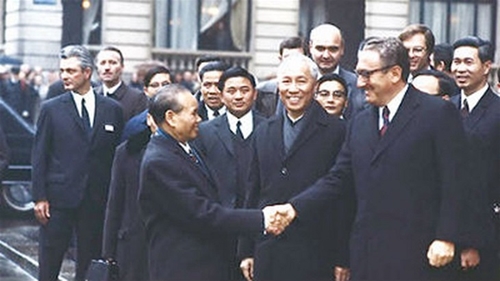The banner of justice and solidarity of the entire Party, people, and military created great political strength. The glorious victories on the battlefield generated a turning point in Vietnam’s diplomatic struggle. The General Offensive and Uprising in Spring 1968 and then, the strategic offensive in 1972 forced the enemy to join negotiation. Especially, the “Dien Bien Phu in the air” victory obligated the U.S. to take a seat at the negotiation table and sign the Paris Peace Accords - an agreement to end the war and restore peace in Vietnam.
    |
 |
|
Minister of Foreign Affairs of the Provisional Revolutionary Government of South Vietnam Xuan Thuy and special adviser Le Duc Tho meeting with U.S. delegation at the Paris Peace Conference (File photo) |
The negotiation table played an important role in the victory of military and political struggles. The negotiation process in Paris was a smooth and close coordination between the negotiation delegation and the State’s leaders, the Ministry of National Defense, the Ministry of Foreign Affairs, and other agencies.
Leaders of the delegation reported the situation to higher levels in the country and followed their instructions. Therefore, the negotiation promptly went on and obtained positive outcomes as planned.
Regarding the Paris Peace Accords, the Vietnamese people reached the target of “repelling the U.S. out of the country,” opening a new phase of the struggle and creating favorable conditions for Vietnam to liberate the South in 1975. The U.S. was committed to respecting Vietnam's sovereignty, independence, reunification and territorial integrity. Meanwhile, the U.S. and its allied powers withdrew their military from Vietnam, ending all military actions in the North and South of Vietnam.
Amid the international situation containing both advantages and disadvantages, the Paris Peace Accords featured the victory of Vietnam’s revolution with the support of the Soviet Union, China, socialist and non-aligned countries, and peace-loving people all over the world.
The signing of the Paris Peace Accords marked the growth of Vietnam’s diplomacy. The resistance war against the U.S. imperialists was an unequal battle. However, thanks to the skillful and thorough application of President Ho Chi Minh’s thought, the Vietnamese diplomatic frontline clearly defined basic targets of the negotiation and mapped out specific strategies to seize ideal opportunities to defeat the enemy.
Upholding the glorious traditions of the ancestors and following President Ho Chi Minh’s thought, diplomacy was seen as a front associated with the military and political fronts to form the synergy for the whole nation to protect the North and liberate the South, reunifying the country. From the 1954 Geneva Conference to the Paris Peace Accords in 1973, Vietnam made impressive strides on the path of building self-reliance and self-resilience diplomacy with international solidarity. These were profound achievements that Vietnam’s diplomacy gained during the Ho Chi Minh era.
The Resolution of the 21st Plenum of the Party Central Committee (October 13, 1973) revealed that the five-year struggle on the diplomatic front in Paris, in close coordination with the military and political combats at home, exerted strong political influences on the world, putting an end to the war in Vietnam. The Paris Peace Accords recorded heroic victories in the resistance war against the U.S. imperialists and marked a great turning point in Vietnam’s revolution.
Promoting the power of national unity combined with the power of the era and President Ho Chi Minh’s thought of “Unit, unity, great unity - Success, success, great success” in negotiation and the signing of the Paris Peace Accords is a critical issue in the process of national renewal, industrialization and modernization and in the cause of national construction and defense in the current context. This is also an objective law of the era amid the trend of internationalization in the world.
Translated by Quynh Oanh